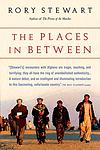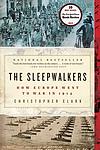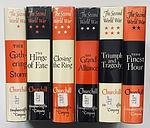The Greatest Russian, British "History, Fiction" Books Since 1900
Click to learn how this list is calculated.
This list represents a comprehensive and trusted collection of the greatest books. Developed through a specialized algorithm, it brings together 300 'best of' book lists to form a definitive guide to the world's most acclaimed books. For those interested in how these books are chosen, additional details can be found on the rankings page.
Genres
The category of "History" in books refers to the study and interpretation of past events, societies, and cultures. It encompasses a wide range of topics, including political, social, economic, and cultural developments, as well as the lives of individuals and groups who have shaped the course of history. History books can be written from various perspectives and may focus on specific time periods, regions, or themes. They aim to provide readers with a deeper understanding of the past and its impact on the present.
Countries
Date Range
Reading Statistics
Click the button below to see how many of these books you've read!
Download
If you're interested in downloading this list as a CSV file for use in a spreadsheet application, you can easily do so by clicking the button below. Please note that to ensure a manageable file size and faster download, the CSV will include details for only the first 500 books.
Download-
1. Life and Fate by Vasily Grossman
"Life and Fate" is a sweeping epic that explores the human condition during the Siege of Stalingrad in World War II. The novel delves into the lives of a wide range of characters, from soldiers and scientists to children and victims of the Holocaust, providing a stark and unflinching portrayal of the horrors of war, the brutality of totalitarianism, and the resilience of the human spirit. At the same time, it also examines themes of love, loss, and the struggle for freedom and dignity in the face of overwhelming adversity.
-
2. Kolyma Stories by Varlam Shalamov
"Kolyma Stories" is a collection of short stories that vividly depict the harrowing experiences of prisoners in the Soviet Gulag during the Stalinist era. Written by Varlam Shalamov, a survivor of the Kolyma labor camps himself, the book offers a raw and unflinching portrayal of the inhumane conditions, extreme suffering, and moral degradation endured by the prisoners. Through his powerful and haunting narratives, Shalamov sheds light on the resilience of the human spirit and the indomitable will to survive amidst unimaginable cruelty.
-
3. 1066 And All That by W.C. Sellar
The book is a satirical take on the history of England, presenting a whimsical recounting of events from Roman times through to the end of World War I, focusing particularly on the year 1066, known for the Battle of Hastings. It parodies the way history is taught, with an emphasis on memorable events, rulers, and dates, often getting facts humorously wrong or presenting them with a comical twist. The work is characterized by its irreverent tone, wordplay, and deliberate inaccuracies, lampooning both historical figures and the supposed objectivity of historians, ultimately suggesting that what is remembered from history is often a muddle of 'what you can remember' and 'what you cannot help remembering'.
-
4. The Convert by Elizabeth Robins
"The Convert" is a thought-provoking novel that delves into the early 20th-century women's suffrage movement in England. The story follows the transformation of its protagonist, a young and well-to-do woman who becomes deeply involved in the fight for women's right to vote. As she becomes more engaged with the suffragette cause, she faces various personal and societal challenges, including the disapproval of her family and the wider public. The novel explores themes of feminism, political activism, and the personal sacrifices made by women who dared to challenge the status quo of their time. Through its vivid portrayal of the suffrage movement, the book provides a nuanced look at the complexities of social change and the power of conviction.
-
5. The Places In Between by Rory Stewart
"The Places In Between" is a memoir by Rory Stewart about his journey on foot across Afghanistan in 2002, shortly after the fall of the Taliban. He travels from Herat to Kabul, encountering a variety of people and landscapes along the way. The book provides a unique insight into the culture and history of Afghanistan, as well as the challenges faced by the country in the aftermath of war. Stewart's writing is both lyrical and informative, making for a compelling read.
-
6. Midnight In Chernobyl by Adam Higginbotham
"Midnight In Chernobyl" is a non-fiction book that tells the story of the 1986 Chernobyl nuclear disaster. The book provides a detailed account of the events leading up to the explosion, the immediate aftermath, and the long-term effects of the disaster. It also explores the political and social context of Soviet Ukraine at the time, and the impact that the disaster had on the country and the world. The book draws on interviews with survivors, officials, and experts, as well as archival documents and scientific research, to provide a comprehensive and compelling narrative of one of the worst nuclear accidents in history.
-
7. Through the Language Glass: Why the World Looks Different in Other Languages by Guy Deutscher
This book explores the link between language and perception, challenging the conventional belief that languages are only tools for describing reality and do not influence the way we perceive the world. The author delves into how different languages can shape the way their speakers understand and interact with their surroundings, arguing that linguistic differences can significantly impact cognition and perception. The book combines linguistic analysis, cultural history, and cognitive science to provide a fascinating examination of how our mother tongue can affect our cognitive processes, including color perception and spatial orientation.
-
8. Claudius The God by Robert Graves
"Claudius The God" is a historical novel that follows the life of Emperor Claudius, who unexpectedly rises to power in ancient Rome. Written as an autobiography, the book provides a unique perspective on the inner workings of the Roman Empire and the challenges faced by Claudius as he navigates political intrigue, assassination attempts, and the complexities of ruling a vast empire. With a blend of fact and fiction, the novel offers a vivid portrayal of Claudius' reign and the tumultuous era in which he lived.
-
9. The Sleepwalkers: How Europe Went To War In 1914 by Christopher Clark
"The Sleepwalkers" by Christopher Clark is a comprehensive account of the events leading up to World War I. The book argues that the war was not caused by any one nation or individual, but rather a combination of factors including nationalism, alliances, and miscommunication. Clark explores the complex political landscape of Europe in the early 20th century and the actions of key players such as Kaiser Wilhelm II and Archduke Franz Ferdinand. The book provides a detailed analysis of the events leading up to the war and challenges traditional narratives of blame and responsibility.
-
10. Their Finest Hour by Winston Churchill
"Their Finest Hour" is the second volume in a series of books that recount the historical events of World War II from the perspective of a key political leader. This volume focuses on the period of intense conflict in 1940, particularly detailing the Battle of Britain and the strategic decisions and leadership that were pivotal during this time. It provides an in-depth look at the challenges faced, the resilience of the British people, and the speeches that rallied a nation under siege, offering insights into military strategies and the personal resolve of the author during one of Britain's most daunting periods.
-
11. The Destruction Of Lord Raglan by Christopher Hibbert
"The Destruction of Lord Raglan" presents a detailed account of the life and military career of Lord Raglan, the British commander during the Crimean War. The book delves into the complexities of his leadership and the strategic errors that led to the infamous Charge of the Light Brigade. It portrays Raglan as a sympathetic yet out-of-touch leader, whose outdated tactics and miscommunications contributed significantly to the disastrous outcomes of certain battles. The narrative not only explores the military aspects but also provides insights into the personal and political pressures Raglan faced, ultimately leading to his downfall and death during the campaign.
Reading Statistics
Click the button below to see how many of these books you've read!
Download
If you're interested in downloading this list as a CSV file for use in a spreadsheet application, you can easily do so by clicking the button below. Please note that to ensure a manageable file size and faster download, the CSV will include details for only the first 500 books.
Download









